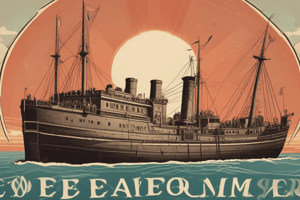Podcast
Questions and Answers
What was the outcome of the Russian Revolution?
What was the outcome of the Russian Revolution?
The Treaty of Versailles made Germany a powerful country.
The Treaty of Versailles made Germany a powerful country.
False (B)
Which country emerged as a powerful nation after World War I?
Which country emerged as a powerful nation after World War I?
The United States
The stock market crash of 1929 is also known as _______________________.
The stock market crash of 1929 is also known as _______________________.
Signup and view all the answers
What is a characteristic of authoritarianism and fascism?
What is a characteristic of authoritarianism and fascism?
Signup and view all the answers
What is ISI?
What is ISI?
Signup and view all the answers
Match the following events with their effects on the global economy:
Match the following events with their effects on the global economy:
Signup and view all the answers
Study Notes
The World Between Wars and the Great Depression
- The Russian Revolution led to the establishment of a communist government in Russia, ending the old regime.
- The Treaty of Versailles imposed harsh penalties on Germany, causing widespread discontent among Europeans and contributing to instability in the region.
- The United States emerged as a powerful nation after World War I.
The Great Depression
- The stock market crash of 1929, also known as "Black Tuesday," was caused by excessive speculation and excitement among investors, leading to a sharp decline in stock prices.
- The Great Depression had a devastating impact on many countries, resulting in widespread unemployment and financial losses.
Latin America During the Great Depression
- The Great Depression had a particularly severe impact on Ecuador, where the decline of cocoa prices led to massive job losses.
Fascist Regimes in Europe and the Import Substitution Industry
Authoritarianism and Fascism
- Authoritarianism is a form of government characterized by a strong leader and limited freedom for citizens.
- Fascism is a type of government with a powerful leader and restricted individual freedoms.
- Both authoritarianism and fascism share common characteristics, including strong leaders and limited opportunities for dissent.
Import Substitution Industry (ISI)
- ISI is a economic development strategy that involves replacing imported goods with domestically produced ones.
- The benefits of ISI include job creation, while the drawbacks include difficulties in exporting goods to other countries.
Fascist Regimes in South America
- Argentina is an example of a country in South America that had a fascist-style government.
Studying That Suits You
Use AI to generate personalized quizzes and flashcards to suit your learning preferences.
Description
Learn about the Russian Revolution, its impact on Russia's government, the aftermath of World War I, the rise of the United States, and the causes of the Great Depression.




